Report on the Workplace Experience Survey Results for Faculty, Barber School of Arts & Sciences (2011, 2014, 2017)
Peter Wylie, Department of Economics, Philosophy and Political Science, March 2018
The following are the results of the 2011, 2014 and 2017 Workplace Experiences Surveys (WES) based on the responses of all faculty in the Barber School – that is, all regular, permanent faculty members as well as sessional faculty, deans, associate deans, heads, post-docs, and research associates. The 2011 and 2014 results are presented in absolute terms and the 2017 results are presented both in absolute terms and relative to the responses of all faculty at UBC (UBCO plus UBCV).
The company that completed the 2017 survey, TalentMap, states: “Generally, a % Favourable of 70 or above is considered good, a % Favourable in the 60s is considered acceptable, and a % Favourable of lower than 60 would indicate the need to investigate further.” Or, to put in the parlance of what faculty members might better relate to, an overall grade of above 70 is good (B- and above), a grade in the 60s in acceptable (C), and a grade lower than 60 is generally unacceptable. An overall grade n the 50s is a marginal pass (D), but generally seen as still not good enough, and a grade lower than 50 is a fail (F) and entirely unacceptable.
The 2011 results overall
54 faculty in the School completed the 2011 survey, a reported response rate of 32%, implying that there were approximately 165 such faculty in the School when the survey was completed in November 2011. The vast majority of the faculty respondents were permanent faculty members (47) and the others respondents were 3 sessional faculty and 4 deans, associate deans, heads etc. The survey misclassified heads as non-bargaining unit faculty.
The 2011 WES results for all faculty in the Barber School were generally negative, reflecting an overall disengaged faculty. The average percent of all faculty giving favourable responses (“very satisfied/satisfied” or “agree/strongly agree” etc.) across all 79 questions in the survey was 47%, which in most faculty members’ estimation is an F, fail.
The results were known as of February 2012 but no action was undertaken by the Barber School Dean’s Office to discuss them with faculty until, on the initiative of faculty members themselves, an ad-hoc committee of the Barber School Faculty Council was established in February 2013. This was the first such committee ever established by Faculty Council, and it was to study the poor results in detail and to make recommendations that would help make the Barber School a better, or at least a less bad, place for faculty to work. No interest was shown by the Dean’s Office in the work of this committee over its approximately one full year of deliberations, and both the Barber School acting dean at the time and the Barber School dean at the time the survey was completed (the then acting provost) refused to meet with the committee.
The 2014 results overall
The 2014 results were brought to the attention of faculty in the School by the Dean’s Office only in November 2017, and, it appears, were not analyzed nor acted upon by the School before then. The 2014 survey reported a response rate of 33%, the same as in 2011, but did not report the actual number of responses. If there were approximately 180 faculty in the School in November 2014 inclusive of all permanent faculty members as well as sessional faculty, deans, associate deans, heads, etc., then a response rate of 33% implies that approximately 60 faculty or so in the School completed the survey in November 2014. The survey in 2014 again misclassified heads as non-bargaining unit faculty.
The 2014 WES results for all faculty in the Barber School were again generally negative, reflecting an overall disengaged faculty. The average percent of all faculty giving favourable responses (“very satisfied/satisfied” or “agree/strongly agree” etc.) across all 69 questions in the survey was 57%, which in most faculty members’ estimation is a D grade, a marginal pass, but generally unacceptable.
The 2017 results overall
The 2017 results were brought to the attention of faculty in the School by the Dean’s Office in February 2018. 82 faculty in the School completed the 2017 survey, a reported response rate of 44% and implying that there were approximately 185 or so such faculty in the School when the survey was completed in November 2017.
The 2017 WES results for all faculty in the Barber School remain generally negative, reflecting an overall disengaged faculty. The average percent of all faculty giving Favourable responses (“very satisfied/satisfied” or “agree/strongly agree” etc.) across all 91 questions in the survey was 49%, which in most faculty members’ estimation is an F, fail.
For UBC overall, the average percent of all faculty at UBC giving Favourable responses (“very satisfied/satisfied” or “agree/strongly agree” etc.) across all 91 questions in the 2017 survey was 61%, so just marginally acceptable. Results for the Barber School are hence an average of 12% lower, pushing the Barber School into the fail, unacceptable range.
So there has been little improvement overall in the Barber School in the results 2011 to 2014 to 2017, and the average grade is an F across the period. So I think we have to ponder why, in our School with its $15m endowment and commitment to “an environment of academic excellence” and “a liberal arts and sciences school in the finest tradition” workplace experiences of faculty are apparently so poor, both in absolute terms and relative to faculty elsewhere at UBC.
Comparison of results of similar questions across the 2011, 2014 and 2017 surveys
Of course an overall grade across all categories and across three different surveys where the questions differ to different degrees, and the respondents differ to different degrees, is only a fairly crude comparison, but still valid to a large extent (we do the same comparisons in the student grade averages in our courses across sections and years). However, if some of the questions remained largely the same across the three surveys it is also instructive to look at the results of specific questions. Unfortunately, the questions change quite a bit across the surveys, especially for the 2017 survey relative to those of 2011 and 2014.
The ad-hoc committee of Faculty Council established to analyze the 2011 WES results for the Barber School identified four major themes of workplace dissatisfaction:
1. Low Level of morale and organizational engagement
2. Dissatisfaction with senior leadership, managerial communications and transparency
3. Dissatisfaction with workload, workload flexibility, support/resources and work-life balance
4. Dissatisfaction with opportunities for career progression and professional development
Themes 1 and 2 fell into the category of “general work atmosphere issues” and themes 3 and 4 into the category of “personal work and workload issues”. The committee presented its final report to Faculty Council in March 2014 and made a number of recommendations that it felt would improve things in each of these two major categories, but none of these recommendations were implemented by the
School. The acting dean and provost at the time showed no interest in the final report of the committee, and made no official response to it, and when its report was brought to the attention of the new(and current) dean in 2016, he said he had never heard of it and hence had never read it.
We will however use these categories found to be the major areas of concern in the final report of the ad-hoc committee to discuss below the differences and similarities between the 2011, 2014 and 2017 results, because these areas still show up in 2017, not unexpectedly given the lack of attention to the results of the 2011 and 2014 surveys by Barber School or University management to date, as the major areas or concern.
Comparison of results of inside and outside the Barber School at UBCO, 2017 survey
The total results for faculty of the 2017 WES for UBCO overall have not been released to the UBCO academic community yet. What has been released is a PowerPoint presentation put together by the survey company for the UBCO Department of Human Resources (HR). In this presentation, only results of 35 of the 91 questions are revealed for faculty only. Avoided entirely in the presentation are the results for the most negative areas for the Barber School and presumably UBCO overall for faculty; work environment, work/life integration, communications, collaboration, immediate unit head/manager, UBCO’s senior leadership, and health and wellbeing. It is perhaps to be expected that HR might wish to dwell on the positive rather than the negative. More worrying is the fact that on the PowerPoint, all of these areas where the % responding favorably at UBCO are the lowest are assigned a “medium to low priority” by HR! Maybe these areas are seen as lost causes?
So the focus of the PowerPoint is only on the “key strengths” to “leverage and expand” that is, the most positive results. It states “focusing on the low…scores…may not fully address what is needed…” Is this not perhaps contradictory to the survey company’s argument that low scores “would indicate the need to investigate further”?
The PowerPoint then states that the focus should be on the areas where the performance is low but that are somehow designated as “key drivers of engagement” – faculty support, senior leadership and collaboration. But then presented are only the detailed results for faculty for only the three most positive scoring areas – professional growth, student focus, and inclusion and respect. Very odd indeed.
The faculty response rate for UBCO overall was 173 out of 459 faculty; or 38%. Since the response rate in the Barber School was 82 out of 185 (44%), that implies that the response rate outside of the Barber School was 91 out of 274, that is a response rate of 33%, for an overall UBCO response rate of 38%. So there was a better response from faculty in the Barber School than from faculty in the rest of UBCO.
Of the results of the 35 questions revealed, for 22 of these questions the results were more-or-less identical for the Barber School and for UBCO overall. For 13 of the questions, the results are much worse in the Barber School than outside of the Barber School. For no question or statement of these 35 were the results for the Barber School more favourable than for UBCO overall. The results of the 13 questions are below where the results for the Barber School faculty (UBCO-BS) are much worse than for faculty outside of the Barber School (UBCO-O). This can be inferred from decomposing the UBCO overall results into UBCO-BS (which is known) and UBCO-O (which is inferred from the overall UBCO results, which are also known).
How are we to interpret these results? Is it just that the Barber School has a higher proportion of grumpy old members (e.g. “heritage faculty”?) than elsewhere at UBCO, or is it that there are there serious problems in the Barber School that don’t exist elsewhere at UBCO? Probably not the first hypothesis (FCCS, Nursing etc. also perhaps have a high proportion of “heritage faculty”) so perhaps the second hypothesis should be taken seriously by the UBCO senior administration and HR?
Read the complete report here: WES 2011 to 2017

 Follow
Follow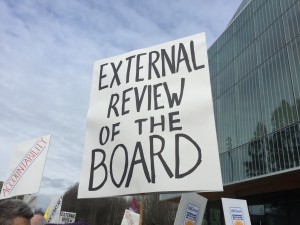
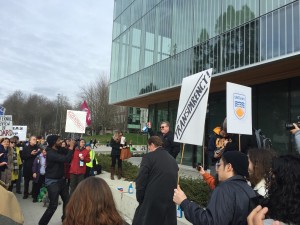
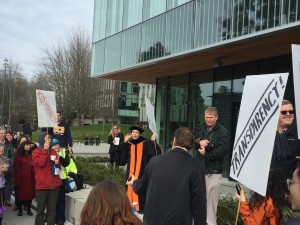
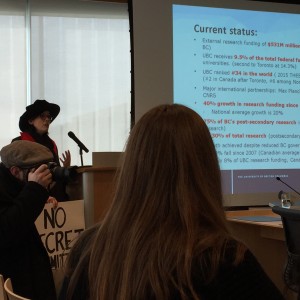
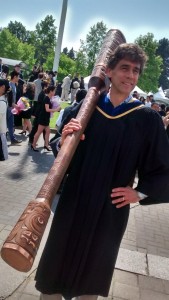
#UBC time to lay down the mace in graduation and governance #ubcnews #bced #highered
*Apologies to the medievalists again. Customized below is our semi-annual appeal to UBC managers to Lay Down the Mace:
As we count down to and roll through graduation, can we please remove the mace from convocation and governance at the University of British Columbia? The mace had its day in the first 100 years of this esteemed University but that day has gone.
Dalhousie University is currently embroiled in controversy over its mace, decorated as it is to demonstrate racial supremacy (“the rose, thistle, fieur-de-lys, and shamrock, depicting the major racial groups of our country”). Indigenous peoples and advocates have said enough already.
Some traditions just aren’t worth maintaining…
At the Nexo Knights’ Graduation Day,
Jestro grabbed a sword, a mace, and a spear and began to juggle them… The unimpressed crowd started to boo… Sweat broke out on his forehead…. He let go of the mace, and it flew across the arena. The crowd gasped and ducked… Then … bam! It hit the power grid on the arena wall. The area lights flickered, then turned off. Soon the power outage surged throughout the city.
Yes, this really did happen in a Lego story! And in England, Bradford College faculty members called the admin’s decision to spend £24,000 on a new mace for graduation ceremonies a “crass bit of judgement.”
At UBC, things were questionable again this past year. With an opportunity to follow faculty and staff members’ and students’ proposal to divest from fossil fuel investments, in mid February UBC chose to continue to be a part of the problem of climate change instead of the solution. Still heavily invested. And after chalking up a $22m budget surplus, in April & May UBC jumped the line at Wholefoods to draw $7,230 in grocery bag donations. On 24 April an Open Letter signed by 110 faculty members was submitted to the UBC Chancellor Reappointment Committee questioning the process.
The days of the mace in Convocation and governance are of the past and that part of the past is no longer worth reenacting.
It’s difficult to know where this University now stands or what it stands for.
It is time to retire the mace, symbol of aggression, authority, and war. It’s time to march to graduation ceremonies in late May and November with open and empty hands as symbolic of peace and reconciliation of controversies and roles of the President’s Office.
UBC’s mace is a relic but a relic of what? The mace is symbolic speech but what is it saying about us now?
From ancient times, this club, this weapon of assault and offence, the mace was gradually adorned until the late twelfth century when it doubled as a symbol of civil office. Queen Elizabeth I granted her royal mace to Oxford in 1589. From military and civil power derives academic authority. The rest is history and it is not all good.
Dr. Thomas Lemieux, School of Economics, with UBC’s Mace at the May 2015 Convocation.
It is time to retire the macebearer, whose importance is inflated every year by the image’s presence on UBC’s graduation pages leading to Convocation. In pragmatic terms, if the mace falls into the hands of the wrong macebearer or manager at this point, someone’s liable to get clocked with it.
Is UBC’s mace still a respectable appendage to Convocation?
Remember, since that fateful November day in 1997, just five months into Martha Piper’s Presidency, when student activists put their bodies and minds on the line at the APEC protest, Tuum Est adorns both the can of mace sprayed in their eyes and the ceremonial mace that the President’s Office is eager to carry across campus every November and May.
Is it not time to retire the mace?
Comments Off on #UBC time to lay down the mace in graduation and governance #ubcnews #bced #highered
Posted in Academic freedom, Academic Labor, Accountability, BC Education, Budgets, Commentary, Critical University Studies, Faculty, Governance, Maces, Shared governance, Students, Working conditions
Tagged Academic freedom, Faculty, Global Warming, Governance, Protests, Students, University presidents, Working conditions